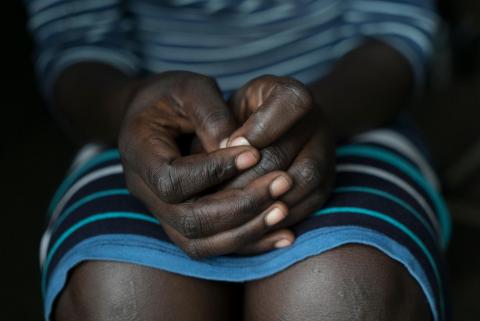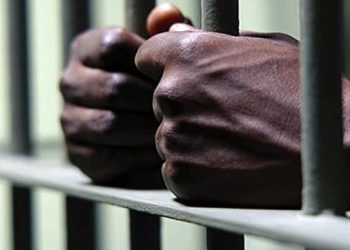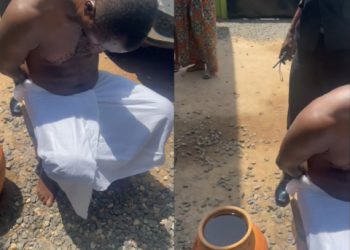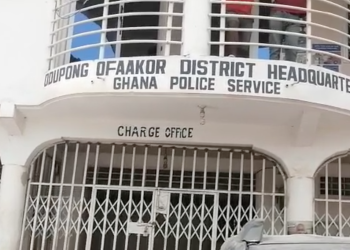Ghana joined the world recently to mark International Women’s Day. Many extolled the strides made by women and looked into the future with so much hope.
Few days after that, heart-wrenching stories of abuse of women popped up and dominated social media. While some of the women died out of abuse, others from the stories, escaped with serious bruises to their bodies and self-esteem.
The stories about abuses are still dominating discussions in some quarters, and one thing which is clear is that we still have a long way to go.
Abuses come in many other forms apart from hitting women – battery. It could be financial, emotional and even sexual.
Physical abuse or battery abounds, but I will deal with that at a later date. Today my attention is on sexual abuses. These abuses may be put broadly under sexual offences.
There are about nine sexual offences named in our statute books. They include rape, defilement, unnatural carnal knowledge, indecent assault, incest, a household permitting defilement of a child, procuration and seduction or prostitution of a child under 16 years.
Although sexual assault can be committed by and against both sexes, it is common knowledge that women and girls suffer more from such offences. I focus on rape and defilement.
According to the Criminal Investigations Department of the Police Service, in 2016, 497 cases were reported for rape, 1,341 for defilement. People who work in communities say these numbers are grossly under-reported to the police.
Unfortunately, most of these victims who report cases of either being defiled or raped do not get justice.
It should be of public interest why girls and women report their abusers to the police. The most important reasons for reporting abuses are that they want the offender to be apprehended and punished; they want to stop the incident from happening again and they think crimes should be reported.
Interestingly, many of those who suffer from these acts are usually from the underprivileged class in society. They depend on minor jobs such as selling sachet water, toffees, and other low earning informal enterprises for a living.
Sometimes they earn less than twenty cedis a day. This is not to suggest that some forms of sexual abuses are not perpetrated against well to do families. Indeed, a number of such occurrences exist, but the sheer preponderance of incidents in low-income households is apparent.
Sexual abuses are clearly a problem and when it is against minors or children, it hurts society’s collective conscience and raises questions about how we have built our communities to protect the weak and vulnerable.
Even though, it is a big problem enough for these crimes to occur in the first place, it is even more troubling why victims often do not get justice when they muster the courage to report their abusers.
The Issues
When one is raped or defiled, the ‘requirements’ they need to meet to prove the offence against their abusers are daunting and sometimes a turn-off. They are asked every so often to show evidence of force or violence which is often in the form of either biting or scratching the hands or even the organs of the accused person. Most of them are viewed with suspicion by those they turn to for help.
The trauma caused the victims by the de-humanizing act shatters their life and hurts their confidence. The effect of this crime on the victims cannot even be quantified. This is the reason why everything must be done to make it easier for victims to report their abusers, and served justice. They face challenges when they seek justice through our legal system. They are asked to make payments for medical reports as evidence, but unfortunately, that is usually not enough for investigations to be conducted. The feet dragging and lack of interest by the investigators conspire to deny the victims justice.
As if that is not enough, a victim is required to make payments of a minimum of 300 cedis as a doctor’s fee for filling out a police medical form. This is important to establish that the act has occurred. But should money be a barrier between the victim and the justice she seeks?
There are instances where a rape victim is required to pay about 800 cedis for a medical form. To the underprivileged, this is extremely expensive and almost a put-off. How does one expect someone who earns twenty cedis a day to expend 800 cedis on a medical report because she has been raped or has a child who has been defiled?
In June 2014, the Ministry of Gender, Children and Social Protection reported that the government had established a Domestic Violence Board and Secretariat and that a legislative instrument was being finalized for the Domestic Violence Act. The same source reported that a domestic fund had also been established to assist domestic violence victims with skills training and medical bills. However, in many hospitals, if victims of sexual assaults require emergency medical reports and treatment, they are first required to make payment which results in the victims not completing the filing of their complaints because they cannot afford to pay for the services of a doctor who will work on the police medical forms. This hinders the pursuit of justice on the part of the victims.
A group, the Coalition for Survivors of Domestic Violence last year stated that the practice of taking medical fees directly from survivors is illegal, unfair, and goes against their rights and called for the fees to be scrapped. A British-Ghanaian actress Ama K. Abebrese also made similar calls last year. The advocacy appears to have lost some steam.
Defiled and impregnated by step-father
Due to the outbreak of the coronavirus pandemic, basic schools in March 2020 were shut down to control the spread of the virus. This meant that children were required to spend quality time with family and friends.
In a story I recently worked on, Madam Gladys Koomson, who lives in a kiosk at Weija SCC, had a different, yet gruelling experience of Covid-19 and its concomitant issues of lockdown, closure of schools and the idleness therefrom. It was life-changing for her and her family as her children were preyed upon. They never got to enjoy the so-called quality time.
Madam Koomson and her two daughters fit the typical description. She collects sachet water rubbers to sell in order to make a living. She found out that her two daughters, aged 15 and 13 were defiled by their step-father. At the moment, the older daughter Achiaa (not her real name) has given birth to a baby boy while the younger one, Kukua (also not her real name) is about 7 months pregnant. In January 2021, the case of defilement was reported to the Police. Though the suspect (her husband and the daughters’ step-father) was arrested, he was granted bail. Madam Koomson couldn’t provide the necessary medical reports to support the case. She could not afford it.
“When I asked her who was responsible, she immediately gave up her step-father and we managed to get him arrested. This gave my older daughter the confidence to also confess that it was their step-father who defiled her once before she left for Kwabenya. She also revealed that she kept it a secret out of fear because he threatened to kill her if she ever told anyone about it. So it is their step-father who is responsible for both pregnancies,” she said to me.
I spoke to the Domestic Violence and Victim Support Unit Coordinator of the Weija Divisional Police Command, ASP Rosemary Vortia on the matter.
According to her, “the first case was reported on the 8th of January and the second case was reported on the 15th of February, 2021. The suspect is on bail but he reports to us every day. So he came and was cautioned on the second case.”
The biggest hurdle to justice for the two minors is that there is no easy way of knowing their ages, though their mother said they’re 15 and 13 years old.
My heart was broken when the DOVVSU official said to me, “they both do not have birth certificates for age assessment.”
The age assessment is important to serve as proof of their ages. This is because it is a case of defilement and there is an age element to this offence.
Sections 101 (1) and (2) of the Criminal Offences Act, 1960 (Act 29) define defilement and prescribe punishment for it:
- For purposes of this Act defilement is the natural or unnatural carnal knowledge of any child under sixteen years of age.
- Whoever naturally or unnaturally carnally knows any child under sixteen years of age, whether with or without his or her consent commits an offence and shall be liable on summary conviction to imprisonment for a term of not less than seven years and not more than twenty-five years.
So for example, if there is no way of proving that they are below age sixteen, the abuser could walk free. But hopefully, other anecdotal means could be employed such as using known events around the time of their birth to determine how old in reality they may be. This is a criminal matter and so the standard of proof is higher.
According to ASP Rosemary Vortia, the police are in the process of assessing the ages of the girls. But their mother says she is troubled anytime she remembers that it is her husband (step-father of the children) who is responsible for the pregnancies.
They are waiting for justice.
They may get discouraged and cannot push further.
Way forward
Victims of sexual violence or abuse deserve better than we currently give them. Law enforcement officers who treat them shabbily must stop or be sanctioned. There are instances where police officers have sneered at victims when they are supposed to be providing them succour. This discourages an already crushed person who needs help to get justice.
We must also exorcise our society of the ‘fa ma nyame’ attitude where obvious crimes will not be reported and punished but swept under the carpet because we want to let sleeping dogs lie. This is usually the case if the abuser is a family member, friend or respected member of society. When people abuse their trust, they must pay for it!
There must be conscious efforts to not stigmatize sexual abuse victims. The Gender Ministry must lead this frontally and give people the confidence and assurance to report such crimes knowing that society will not stigmatize them. Also, some survivors hesitate in seeking justice because either they do not want others to know their predicament or they want to save the reputation of their family which is usually encouraged by their kinsmen.
Further, these victims must be provided counselling assistance. If you have never been raped, defiled or seen anyone experience it or involved with dealing with the effects of this crime on a person, this may sound remote to you. Imagine a young girl or boy defiled and finds herself or himself in a situation where there is nobody to talk to, because there is just no one or they cannot trust anybody again. There are times nobody even believes their story. Making counselling services available at hospitals, community centres, religious places and even on toll-free lines will be a great way to help victims recover.
In conclusion, even though society has made some progress, a lot more can be done to improve the lives of sexual abuse victims. It just does not make sense why a victim of such crime must be asked to pay about three hundred cedis before a crucial evidential document like a medical report can be processed to help punish an abuser. We must make the talk about punishing abusers real by helping clear the hurdles on the way to justice!
—
The writer, Naa Adoley Moffatt, is a broadcast journalist with Citi FM/Citi TV. She also co-hosts the social media entertainment program ‘30 minutes’ on Citi TV every weekday at 5 pm.











